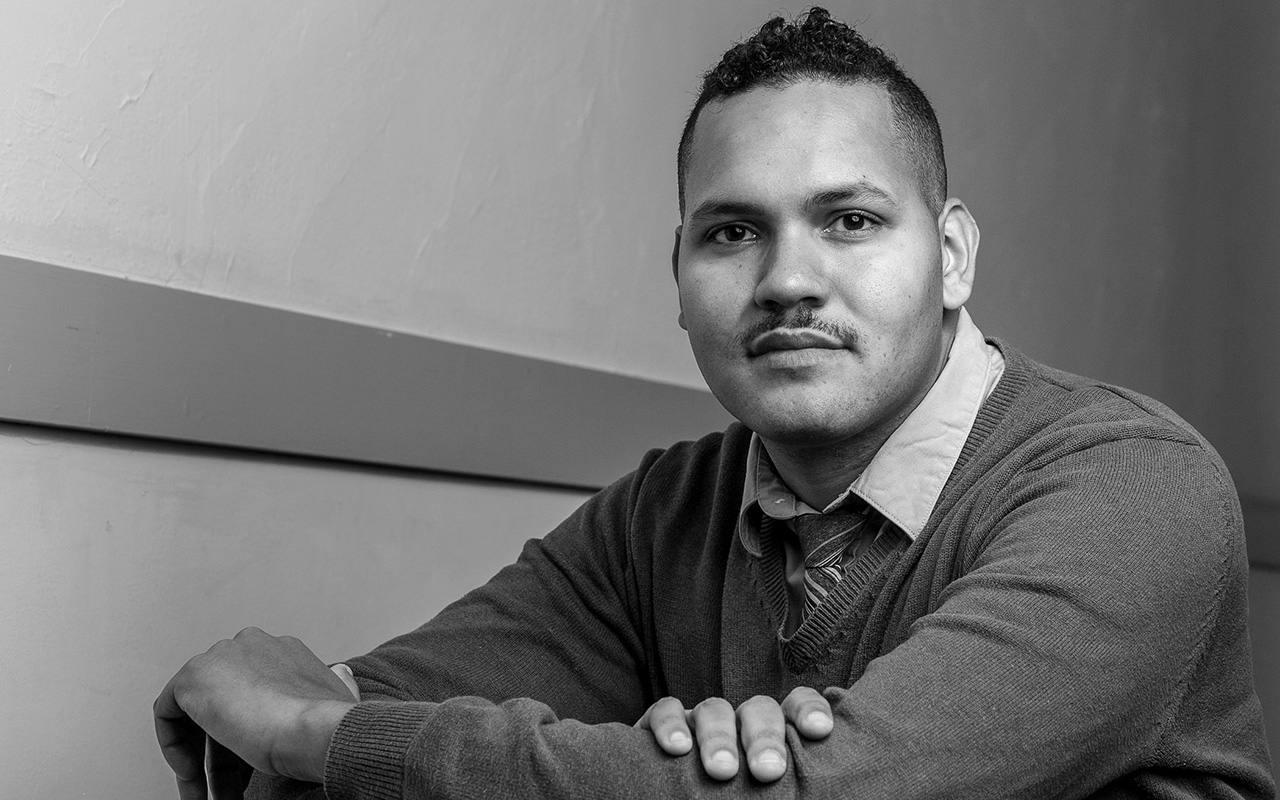
Ahamefule J. Oluo photo by Daniel Sheehan
“This place feels haunted at two in the morning,” composer, musician and comedian Ahamefule Oluo says. He sits center stage at a Steinway grand piano, under Town Hall’s stained-glass cupola, surrounded by concentric semicircles of original, century-old wooden benches that slope up and away from the stage like an ancient Greek or Roman amphitheater. He plays and meditates on musical themes, getting to know how the space reacts to his pieces and thinking about the stage setup.
“Here, I have the time to integrate the performance space. Usually you just have to rush through a sound check. I even know where the light switches are,” Oluo says. “I can do something that is only possible here. I will combine talking and music while respecting their unique art forms.”
On December 9, Oluo presents Now I’m Fine at Town Hall Seattle. Combining music and spoken word, the intimate and purposefully melodramatic work is the culmination of Oluo’s three-month artist residency at the performance venue. During the residency, Oluo also participated in Scratch Nights – experimenting and engaging audiences with the craft and crux of storytelling.
Now I’m Fine is an ambitious autobiographical piece with 15 performers. The brass ensemble includes trumpeters Samantha Boshnack, Scott Morning, Bill Jones, French horn player Josiah Boothby, trombonists Nathan Vetter, Naomi Siegel and tuba player Jon Hansen. The string ensemble includes Sam and Jacob Anderson of Hey Marseilles on cello and viola. The rhythm section includes bassist Evan Flory-Barnes, keyboardist Josh Rawlings, drummer D’Vonne Lewis and harpist Monica Schley. Okanomodé will sing and Oluo will deliver spoken passages.
Now I’m Fine springs from a time six years ago when Oluo was definitely not fine. “Within six months, my dad died, my first marriage ended, I contracted bronchitis and had an autoimmune reaction to an antibiotic. I was diagnosed with Stevens-Johnson syndrome (progressive toxic epidermal necrolysis) and lost skin around my mouth, hands, feet, fingernails, toenails and inside my eyelids. I took Dilaudid [a narcotic for pain].” From his illness came inspiration.
Alone in his apartment, Oluo reflected on the story of his life. His trumpet waited silently until his lips healed. The only way to make music was with a small Baldwin organ in his closet. He tapped out melodies and chord progressions while he meditated.
Born 30 years ago of an American mother and estranged Nigerian father, Oluo grew up poor in Seattle. “We never had electricity or a phone,” he says. “For a while I lived in a Honda Civic with my mom and sister.” Oluo experienced severe social anxiety. “I couldn’t talk to people. I had no friends.”
Oluo became obsessed with creating art. He drew. He attempted to make a guitar from found objects. “I would do anything to get out of that constant anxiety.”
Before he found creative outlets, Oluo destroyed things. “I ate wood. I cut up a couch with a knife. Even now, I turn difficult when I don’t have an outlet to express my demons. I have to find things that work.”
As a boy, Oluo idolized jazz trumpeter Booker Little. He began playing trumpet and befriended drummer D’Vonne Lewis during high school. Trombonist Julian Priester worked and recorded with Booker Little in the 1950s, so Oluo enrolled at Cornish College of the Arts where Priester taught.
Feedback at school did not line up with Oluo’s artistic path, so he did not re-enroll after the first year. “I’m grateful for dropping out. College makes you better at your instrument. If I got better, I would have become a jazz trumpet player. I’m happy with the diversity of my career.”
Oluo continued to perform musically from his jazz roots while he branched out into standup comedy and writing. “Jazz is exploratory music,” he says. “No matter what I do, there is a jazz person at the heart of it.” After years of developing as a writer, storyteller and musician, Oluo hit the rough patch that became the genesis for Now I’m Fine.
In an apartment upstairs from Oluo at that time, bassist Evan Flory-Barnes was developing his own autobiographical opus Acknowledgement of a Celebration, fueled by a grant from Meet the Composer. Flory-Barnes would stop by to check in on Oluo, who would later perform in Flory-Barnes’ piece and design packaging for his DVD. The two also performed frequently together with drummer D’Vonne Lewis and pianist Josh Rawlings in the band Industrial Revelation.
For the five years following his illness, Oluo worked on the stories and musical ideas, adapting them for bands and standup comedy routines. “Most of them didn’t fit. But they developed into story telling and a pop opera.”
Inspired by Flory-Barnes’ success with Acknowledgement, Oluo sought institutional backing to mount this large-scale project. Through comedian Hari Kondabolu, Town Hall contacted Oluo to consult on the development of an artist-in-residence program. Eventually, Oluo interviewed for and was offered a three-month residency. He was given a key to access the building whenever he wanted, encouraged to immerse himself in the program offerings and learn from everything.
The fitness of Oluo’s work and the performance space are echoed in the poem US poet laureate Robert Pinsky wrote in 1999 for Town Hall’s reopening. It begins:
The hero travels homeward and outward at once,
Master of circumstance and slave to chance.
A spirit old and young, man, woman – each life
A spurt of knowing. The hero is the wife
Stitching all day a story unstitched at night
And also the son who calls the Council to meet
In the beamed Hall where the old ones used to gather.
Differing there, each regards all and each other. …